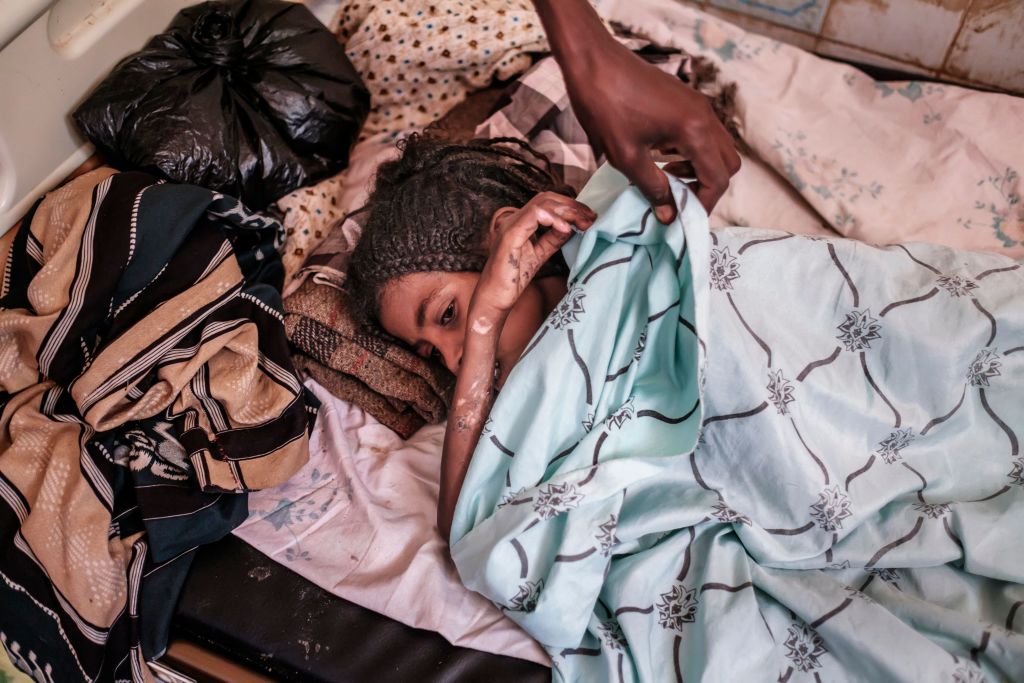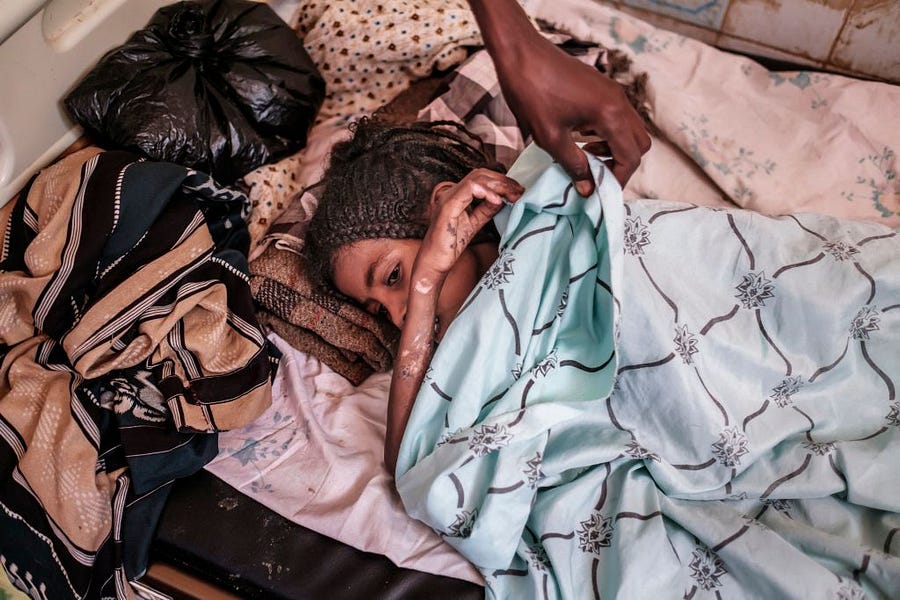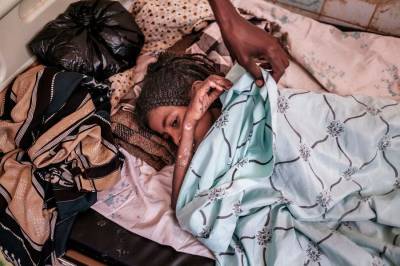Happy Monday! Scottie Scheffler won the Masters yesterday at just 25, in his third appearance at the tournament. It was Scheffler’s fourth win in the PGA Tour’s last six events and one that keeps him as the world’s top ranked golfer.
Quick Hits: Today’s Top Stories
With Russian forces regrouping and pivoting toward Ukraine’s eastern Donbas region, President Vladimir Putin has reportedly tapped Gen. Alexander Dvornikov—also known as the “Butcher of Syria” for leading brutal campaigns against civilians—to head up Russia’s operations in Ukraine. A missile struck a train station in the eastern Ukrainian city of Kramatorsk on Friday, reportedly killing at least 52 people and wounding countless others trying to flee impending Russian aggression. Satellite imagery taken over the weekend showed hundreds of Russian military vehicles forming an eight-mile convoy and heading toward the Donbas region. After the United States promised to deploy a Patriot missile system—manned by American troops—to Slovakia, Slovakia agreed to transfer one of its S-300 missile defense systems to Ukraine.
Pakistan’s parliament voted 174-168 on Sunday to oust Prime Minister Imram Khan in a vote of no confidence related to economic and foreign policy mismanagement. Although no Pakistan prime minister has completed a full five-year term, Khan—a former cricket star—is the first to be expelled by parliament. Khan sought to disrupt the vote by dissolving parliament and dismissing criticism of him as a “foreign conspiracy,” and he reportedly discussed imposing martial law.
French President Emmanuel Macron will face off against nationalist Marine Le Pen in a presidential runoff election on April 24 after both candidates failed to surpass 50 percent of the vote in the first round of balloting over the weekend. Macron enters the runoff a slight favorite—with 97 percent reporting last night, he had secured 27.6 percent of the initial vote to Le Pen’s 23.4 percent—but Le Pen’s brand of populism has gained steam in the country since the pair last faced off in 2017.
Prime Minister Fumio Kishida announced Friday that Japan will ban Russian coal imports, which currently account for about 13 percent of Japan’s power generation. He did not specify when the move will go into effect, but added that Japan will also expel eight Russian diplomats, prohibit vodka and timber imports from Russia, and bar new investment in Russia by Japanese individuals and entities.
In a sign Russia’s economy may have begun to stabilize following the imposition of international sanctions, the country’s central bank announced Friday it was cutting its main interest rate 3 percentage points, from 20 percent to 17 percent. “External conditions for the Russian economy are still challenging, considerably constraining economic activity,” the bank said. “Financial stability risks are still present, but have ceased to increase for the time being.”
The U.S. State Department issued an advisory on Friday recommending Americans “reconsider” any travel to China due to the country’s “arbitrary enforcement of local laws and COVID-19-related restrictions.” Non-emergency U.S. government employees and their family members will be allowed to leave the consulate in Shanghai for the same reason. Shanghai remains under strict lockdown as of Monday, with Chinese authorities claiming a record 26,000 new COVID-19 cases were reported in the city yesterday.
Former President Donald Trump announced Saturday he is endorsing Dr. Mehmet Oz in Pennsylvania’s GOP Senate primary, arguing the television personality has “lived with us through the screen and has always been popular, respected, and smart.” The move split Republican activists, some of whom have expressed concern about Oz’ pro-choice past and close ties to the Turkish government. Former U.S. Sen. Rick Santorum of Pennsylvania endorsed Dave McCormick—former Bush administration official and hedge fund CEO—in the race on Sunday..
‘We Will Erase You From This Land’

A new report from Amnesty International and Human Rights Watch draws on more than 400 interviews—plus forensic, satellite, and video evidence—to argue security forces and local officials in a contested region of Ethiopia carried out systematic attacks on ethnic Tigrayans that amount to ethnic cleansing and crimes against humanity. Ethiopia’s federal government was aware of the brutality, the report alleges, and may have helped facilitate it.
In 2018, massive protests in Ethiopia brought an end to nearly three decades of Tigrayan-led rule under the Ethiopian People’s Revolutionary Democratic Front (EPRDF) marred by its own repressive tendencies and human rights concerns. Current Ethiopian Prime Minister Abiy Ahmed, an Oromo, was brought to power, and he began his term with releasing political prisoners and in 2019 winning a Nobel Peace Prize for ending a longstanding border conflict with neighboring Eritrea.
But Abiy also removed Tigrayan leaders he accused of corruption and dissolved the government coalition Tigray had led. Tensions escalated further in September 2020, when Tigrayans held a regional parliamentary election in defiance of Abiy’s postponement of the vote as a COVID-19 precaution. That tension erupted into violence in November 2020, and the United Nations soon accused both sides of war crimes, including looting, civilian killings, and sexual violence. Hunger was already an enormous problem in Ethiopia due to famine; the war made the situation much more dire. The United Nations estimates more than 4 million people have been displaced by the war and natural disasters and more than 9 million need aid–but Abiy cut off phone and internet service in Tigray, and the U.S. has accused him of deliberately blocking aid workers’ access to the region, making it difficult to get accurate counts.
Territorial gains seesawed back and forth for a year, but fighting cooled in December as Abiy committed not to follow retreating Tigray People’s Liberation Front forces. Under heavy international pressure, Abiy announced a humanitarian truce March 24 and allowed two aid convoys to bring Tigray essential supplies—split peas, insulin, formula for malnourished children.
The new Amnesty and HRW report assembles formerly scattershot reports from early in the war into an account of systematic abuses in long-contested Western Tigray, an area quickly seized at the outset of the war by forces aligned with the Ethiopian government. The report alleges those forces then made a concerted effort to push out the Tigrayans. (Previous reports have recounted alleged abuses by Tigrayan forces.)
Tigrayans interviewed for the report spoke of militias delivering flyers warning them to leave, taunts blaring through loudspeakers, towns holding meetings about how to push them out, and officials organizing buses to drive them away from the region. They also allege beatings and murder, including one incident where officials lined up about 60 Tigrayans near a river crossing and shot them. A man who said he survived the shooting, presumed dead, allegedly heard a soldier say, “Tigrayans don’t die easily, shoot again.” According to the report, a woman raped in front of her children was told, “You Tigrayans should disappear … You are evil and we are purifying your blood.”
The report leads readers to a conclusion not dissimilar to what we wrote last week about Bucha. “The significance of this report is the allegation or argument that these were not just ‘battlefield decisions,’ that there was a strategy employed by the government and its allies to ethnically cleanse and to eliminate,” Cameron Hudson, a fellow at the Atlantic Council’s Africa Center who has worked in genocide prevention, told The Dispatch. The report says these accounts constitute ethnic cleansing, war crimes, and crimes against humanity.
International law requires accountability for those crimes, and that could force the U.S. to change tactics slightly in its push for peace. The administration has punished Ethiopia with economic sanctions, suspended it from a trade group, and—while condemning both sides—warned that Abiy’s aggression has corroded Ethiopia’s relationship with the U.S. The State Department has praised gestures toward peace and delayed declaring the killings genocide to leave room for diplomacy. When Abiy released political prisoners in January, Biden called him—a status boost for the prime minister that may have earned the U.S. some goodwill.
But the report’s allegations aren’t something the U.S. can easily sweep under the rug in the name of peace, Hudson argued. “We are only now beginning to learn how bad this conflict was at the outset,” he said. “It makes it that much more difficult for the United States to just look for a politically expedient way out.” He also noted that, despite the ceasefire, the conflict may not be over. The war is popular among Ethiopians who remember the Tigrayans’ abuses while they held power, and they may push Abiy to resume fighting—especially if the current peace overtures don’t quickly translate to relief from economic sanctions. Hudson argued the Biden administration is unlikely to revert to condemning Abiy, since its recent change of tone seems to have encouraged his peace overtures.
It’s too soon to say what the report could mean for a future peace agreement. The State Department issued a statement Friday calling for “credible investigations into and accountability for atrocities committed by any party to the conflict as part of any lasting solution to the crisis.” Ethiopian officials said Thursday they are “carefully examining” allegations in the rights groups’ report, but questioned its reliability, calling it an “unfair attack against the gallant forces.”
Meanwhile, people like Terhas, a Tigrayan woman interviewed for the report, say they have already seen too much death. “I saw them shoot one person in the chest,” she said. “He fell on the ground, on his back. I turned my face away immediately and uttered: ‘In the name of the Father.’ I didn’t want to see any more.”
Worth Your Time
We’re a little late to it, but Kevin Williamson’s most recent newsletter—on the relationship between conservatives and the GOP—is very much worth your time. “Looked at dispassionately, the Republican Party is an organization that has for a long time been only partly useful to conservatives and that is becoming less useful each day,” he writes. “You may have noticed that the two kinds of people who argue most intensely for the complete identification of the conservative movement with the Republican Party are professional progressives and entrepreneurs in the more commercial side of right-wing media—in this, and in much else, those interests are quite closely aligned. What conservatives will have to do in the post-Trump era is what conservatives have always had to do—take our wins where we find them, be realistic about our prospects, and expect to be disappointed by politicians.”
In his latest Bloomberg column, Matthew Yglesias points out the inflationary effects of the Biden administration’s renewal of the student loan repayment moratorium—while noting it won’t even benefit that many people. “The economy no longer needs stimulus—in fact, it needs to restrain demand,” he writes, noting the non-collection of student loans has the “opposite” effect. “A majority of the public, meanwhile, has $0 in student debt. If you limit your analysis to people under 30, the median student loan balance is still $0. For African-Americans, it’s $0. Most people do not go to college and do not incur student loan debt, and those non-debtors have lower incomes on average than the people who do go to college and do have debt. Restarting student debt collections would restrain inflation at the expense of a disproportionately high-income minority of the population. Broad debt cancellation, by contrast, would boost inflation.”
People rarely change their minds during conversations that become battles of ideas, Arthur Brooks points out in his weekly Atlantic column. “The way that people tend to argue today, particularly online, makes things worse,” Brooks writes. “Disagreements can feel like a war in which the fighters dig trenches on either side of any issue and launch their beliefs back and forth like grenades. You wouldn’t blame anyone involved for feeling as if they’re under fire, and no one is likely to change their mind when they’re being attacked. These sorts of fights might give everyone involved some short-term satisfaction—they deserve it because I am right and they are evil!—but odds are that neither camp is having any effect on the other; on the contrary, the attacks make opponents dig in deeper. If you want a chance at changing minds, you need a new strategy: Stop using your values as a weapon, and start offering them as a gift.”
Presented Without Comment
Also Presented Without Comment
Also Also Presented Without Comment
Toeing the Company Line
On the site today, Chris Stirewalt bemoans the Democratic operatives who continue to push their party toward a midterm strategy of trying to juice turnout among young, low-propensity progressive voters—a recipe, he argues, for an electoral shellacking at the end of the year.
Congress finally got its act together on Thursday and sent a Russian trade bill to President Biden’s desk. “After weeks of negotiations and tinkering with the bill, senators landed on the most simple compromise possible,” Haley writes in Friday’s Uphill. Plus: Harvest on continuity of government in the event of a mass casualty event.
On Friday’s Dispatch Podcast, Sarah, Jonah, and David discuss Ketanji Brown Jackson’s confirmation to the Supreme Court and what it portends for future Supreme Court fights. Plus: Why did the Biden administration revoke Title 42? Will Vladimir Putin stand trial for Russian war crimes? And should the Capitol Hill fox have been euthanized?
Jonah’s latest G-File is about the importance of optimism—or hope—in a world that seems increasingly grim. “A lot of people are so addicted to narratives of despair about how ‘the other side always wins’ and ‘things are only getting worse’ that we tend to blind ourselves to positive trends or downplay more encouraging developments,” he argues. “And if you blind yourself to the good stuff, it will make it that much harder to build on it.”
In Sunday’s French Press, David dives back into the debate surrounding critical race theory. “There’s an entire cottage industry of Christian voices who relentlessly police American evangelicalism for evidence of ‘wokeism’ or ‘CRT,’ and the definition of both concepts is almost impossibly broad,” he writes. “This is the exact wrong time to close Christian hearts and minds to thoughtful voices, including thoughtful voices who offer new approaches to our understandings of race and justice in the United States.”
A group of Dispatch staffers went to go see Everything Everywhere All at Once last weekend, and Alec reviewed it for the website on Saturday. “When people complain that so much of what Hollywood makes these days are just sequels and reboots and remakes, Everything Everywhere All at Once is the type of movie they’re wishing would get made more,” he writes. “Go see it. Reward originality.”
Let Us Know
With Ethiopia and Ukraine, do you think Americans will look back in a few years and wish the United States intervened more directly to stop atrocities against people around the world? Or will future generations appreciate our current restraint and refusal to get our own troops ensnared in additional conflicts?







Please note that we at The Dispatch hold ourselves, our work, and our commenters to a higher standard than other places on the internet. We welcome comments that foster genuine debate or discussion—including comments critical of us or our work—but responses that include ad hominem attacks on fellow Dispatch members or are intended to stoke fear and anger may be moderated.
With your membership, you only have the ability to comment on The Morning Dispatch articles. Consider upgrading to join the conversation everywhere.